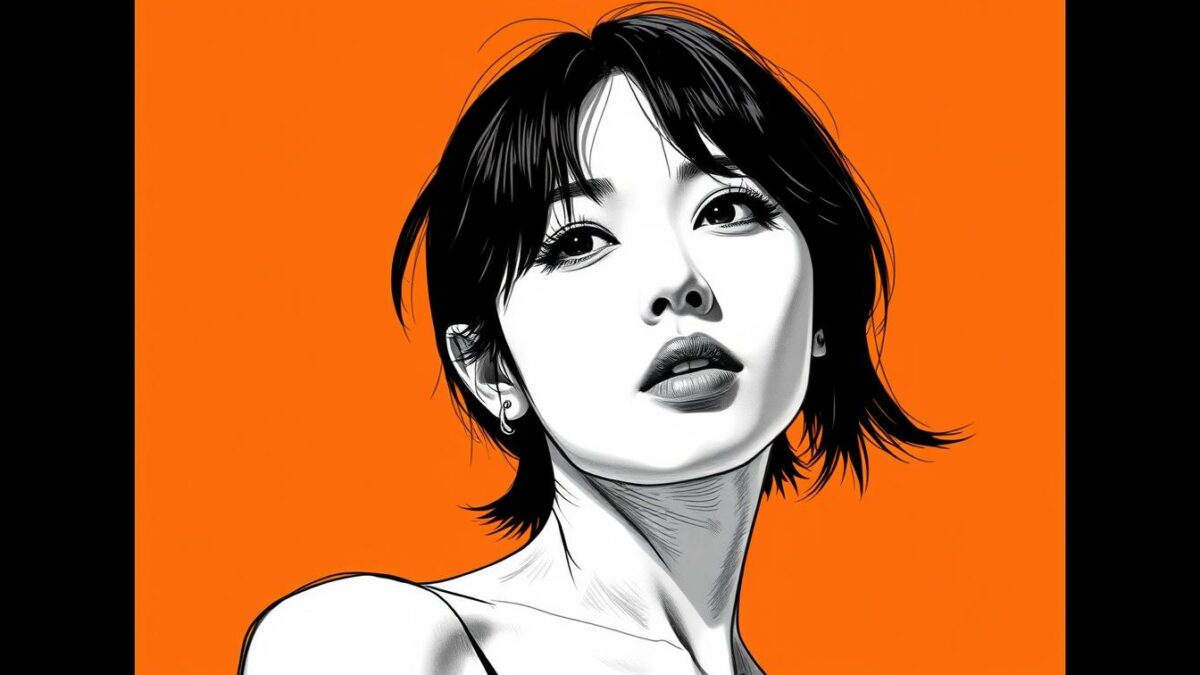From Osaka Prefecture, a distinctive voice emerged. It belongs to the singer Nagi Yanagi, an artist known for her ethereal sound.
Her early fascination with music shaped a remarkable path. She grew into one of Japan’s most sought-after performers for anime themes.
Stylized as yanaginagi, her stage name reflects a unique artistic brand. It bridges the worlds of J-pop and digital vocal performance.
Signed to NBCUniversal Entertainment Japan, she built a career spanning nearly two decades. Her work connects mainstream success with dōjin music culture.
In 2019, she shared a personal milestone on her official website. She announced her marriage, marking a new chapter alongside her creative achievements.
This is the journey of the singer Nagi. From childhood experimentation to a voice with a literary, haunting quality.
Early Life and Musical Beginnings
Musical curiosity sparked early when a neighbor’s unwanted keyboard found new purpose. A young Nagi Yanagi discovered the instrument destined for disposal. This simple act ignited a lifelong passion for sound.
Childhood Inspirations and Musical Experimentation
She began singing along to nursery rhymes, often creating her own melodies. These childhood experiments revealed a natural instinct for composition. The electronic keyboard became her first creative outlet.
During junior high, her brother introduced her to music production software. This opened new creative possibilities. Despite her growing interest, she initially focused on composing rather than singing.
Digital Cover Performances and Dōjin Music Roots
In 2006, she began posting cover versions of popular songs online. Using the name Gazelle on Nico Nico Douga, she entered Japan’s thriving digital music community. Her sincere interpretations quickly gained attention.
Simultaneously, she launched original music projects under the name CorLeonis. This dōjin music work allowed creative freedom. She built a grassroots following through independent releases.
| Album Name | Release Year | Description |
|---|---|---|
| EN | 2006 | First independent studio album release |
| Leonis | 2007 | Showcased evolving musical style |
| Freirinite | 2008 | Demonstrated technical growth |
| Oort no Yume | 2010 | Final independent album before professional breakthrough |
These early digital platforms provided essential experience. They laid the foundation for her future career in anime music. The artist now known as yanaginagi began her journey here.
Rise with Supercell and the Digital Music Movement
When Ryo of Supercell uploaded “Melt,” an immediate response signaled future partnership. The digital music platform Nico Nico Douga became their meeting ground.
Collaboration with the J-pop Band Supercell
Yanagi’s cover of the Supercell song caught Ryo’s attention. He had admired her voice from earlier uploads. This led to a professional invitation.
The artist joined Supercell’s staff for their debut single in 2009. “Kimi no Shiranai Monogatari” became an instant classic. It served as the ending theme for Bakemonogatari.
Her voice reached millions through this anime exposure. The collaboration continued through 2011 with more successful releases.
| Release Year | Song Title | Anime Connection |
|---|---|---|
| 2009 | Kimi no Shiranai Monogatari | Bakemonogatari ending theme |
| 2010 | Sayonara Memories | Supercell single release |
| 2010 | Utakata Hanabi | Featured in anime promotions |
| 2011 | Today Is A Beautiful Day | Studio album with multiple tracks |
Each song showcased the unique blend of Ryo’s compositions and Yanagi’s delivery. Their work appeared in series like Naruto Shippūden.
The partnership proved digital platforms could launch serious music careers. It bridged underground culture with mainstream J-pop success.
Nagi Yanagi: Impact on Anime Music
Her understanding of narrative made her a sought-after artist. She crafts theme songs that feel like a natural extension of the anime itself.
Signature Anime Themes and Unique Vocal Style
The singer’s voice carries a literary, haunting quality. It adds emotional depth and lyrical sophistication to every project.
She matches the narrative tone and character arcs perfectly. This skill makes her a go-to vocalist for series seeking a powerful musical identity.
Notable Contributions to Popular Anime Series
Her solo career launched with the ending theme for Waiting in the Summer. This began a prolific period of contributions.
She became synonymous with the My Youth Romantic Comedy Is Wrong, As I Expected series. Her opening themes captured its bittersweet mood of adolescent introspection.
Her work spans many genres, proving great versatility.
- Action: Provided complex ending themes for Jormungand.
- Fantasy: Added an ethereal quality to Seraph of the End and Berserk.
- Romance/Drama: Defined the oceanic longing in A Lull in the Sea.
- Mystery: Conveyed tension with the opening theme for Amnesia.
Each song showcases her ability to shape the anime viewing experience. Her music remains a vital part of these stories.
Solo Debut and Career Milestones
February 2012 marked a pivotal turn, as the artist stepped into the solo spotlight. Signed to Geneon, she built a career defined by artistic independence and strategic anime partnerships.
Breakthrough Single “Vidro Moyō” and Early Releases
Her solo career officially launched with “Vidro Moyō.” This song served as the ending theme for Waiting in the Summer. It debuted at number 11 on the Oricon charts.
This strong showing validated her decision to pursue solo work. It confirmed her voice could carry a project on its own merit.
Just two months later, she collaborated with composer Jun Maeda. Together they produced the original concept album Owari no Hoshi no Love Song.
The album finished an impressive 6th on the Oricon charts. It showcased her ability to navigate a narrative-driven musical project.
Her second single, “Ambivalentidea,” arrived in June 2012. It reinforced her presence as the ending theme for the anime Jormungand.
Her debut solo album, Euaru, was released in July 2013. It peaked at number 4, solidifying her as a commercially viable solo artist.
A steady stream of albums followed over the next decade. Each release, from Polyomino to White Cube, explored new sonic textures.
This consistent output demonstrated rare artistic ambition and audience loyalty in a fast-paced industry.
Artistic Style, Influences, and Innovation
Behind every haunting melody lies a meticulous approach to songcraft that blends modern technology with timeless storytelling. The artist’s creative process reveals how digital tools and literary sensibilities converge.
Distinct Musical Style and Production Techniques
Desktop music software transformed her teenage years into a creative laboratory. She discovered she could compose without traditional instrumental mastery. This democratized approach shaped her entire musical philosophy.
Her influences include sophisticated vocalists like Akino Arai, Yoko Kanno, and Maaya Sakamoto. Each inspired her desire to create emotionally layered music. The 1996 song “Flower Crown” by Goddess in the Morning particularly shaped her poetic aspirations.
| Musical Influence | Contribution to Style | Notable Impact |
|---|---|---|
| Akino Arai | Emotional depth in vocal delivery | Inspired poetic songwriting approach |
| Yoko Kanno | Narrative musical composition | Shaped anime theme integration |
| Maaya Sakamoto | Sophisticated pop sensibility | Refined vocal performance style |
| Goddess in the Morning | Literary lyricism | Early inspiration for poetic depth |
Literary and Cultural Influences in Her Lyrics
She often consults dictionaries while writing song lyrics. This practice achieves what she calls a “more literary feel.” Her words carry precise, abstract qualities that elevate typical anime themes.
For the song “Ambivalentidea,” she deliberately crafted contradictory imagery. The title itself blends ambivalence with visualization. This mirrored the moral ambiguity of the Jormungand anime series.
As music producer for Just Because!, she tailored instrumental choices to specific scenes. She drew from unconventional references like picture stories and high school baseball chants. This grounded the music in authentic adolescent experiences.
Global Performances and International Recognition
The artist’s voice traveled far beyond Japanese shores, connecting with audiences across continents. Her international presence grew steadily from 2014 onward.
She began with Anime Festival Asia Singapore in November 2014. This marked her first major overseas appearance.
Live Performances and Tours Across Asia, Europe, and North America
July 2015 brought a European debut with shows at Japan Expo in Paris and Hyper Japan in London. She followed with SMASH! in Sydney that August.
Animax Carnival became a recurring platform for her Asian tours. She appeared at Animax Carnival Malaysia in March 2016.
Later that year, she performed at Animax Carnival Philippines in October. These events celebrated Japanese pop culture with enthusiastic crowds.
August 2019 marked her North American debut at Anime Revolution in Vancouver. This completed her performance footprint across three continents.
| Year | Event | Location |
|---|---|---|
| 2014 | Anime Festival Asia | Singapore |
| 2015 | Japan Expo | Paris, France |
| 2015 | Hyper Japan | London, UK |
| 2016 | Animax Carnival | Malaysia |
| 2016 | Animax Carnival | Philippines |
Her official website and social media kept fans informed about tour dates. The staff shared behind-the-scenes content each season.
These live events allowed direct interaction with international audiences. Her anime themes resonated across language barriers.
She solidified her status as a global artist. Her music transcended geography through powerful live performances.
Discography, Chart Success, and Awards
A consistent presence on the Oricon charts reflects a career built on both artistic integrity and commercial appeal. The artist’s journey from independent releases to mainstream success is documented in her prolific output.
Album Highlights and Single Chart Performances
Her major label debut album, Euaru, became a landmark achievement. It peaked at number 4, her highest chart position. This success was fueled by popular anime tie-in songs.
Singles like “Harumodoki” and “Megumi no Ame” became fan anthems. Both served as opening themes for different seasons of a popular anime series. They charted at number 8 and 7, respectively.
Her work extends to recent projects like The Day I Became a God. For this anime, she performed both the opening and ending theme song. This dual contribution showcased her versatility.
She also provided the opening theme for The Case Files of Jeweler Richard. The song captured the series’ elegant and mysterious atmosphere. Her ability to match a show’s tone remains a key strength.
This consistent chart performance over nearly two decades solidifies her status. She is a reliable and respected voice within the anime music industry.
Reflections on Nagi Yanagi’s Enduring Legacy
A quiet power defines this artist’s lasting impact on anime music. Her work merges literary depth with memorable J-pop melodies.
For over a decade, her solo career has produced iconic theme songs. These tracks capture the subtle emotions of the stories they accompany. She became a trusted voice for series valuing nuance.
Her journey from online covers to award-winning productions shows a modern path for artists. She maintained creative integrity within the commercial anime industry.
Her role expanded beyond singing to music production, shaping entire series’ soundscapes. Recognition at events like the Newtype Anime Awards affirmed her significant cultural contribution.
Balancing a vibrant career with personal life, she continues to create. Her most recent album, White Cube, signals an ongoing, evolving artistic journey. Her legacy is a belief that anime music can be profound art.




